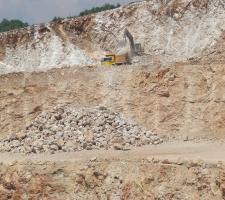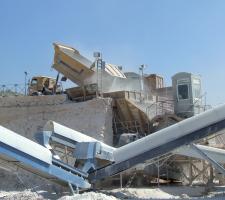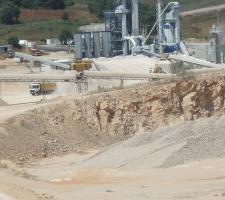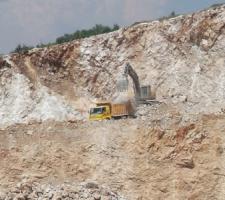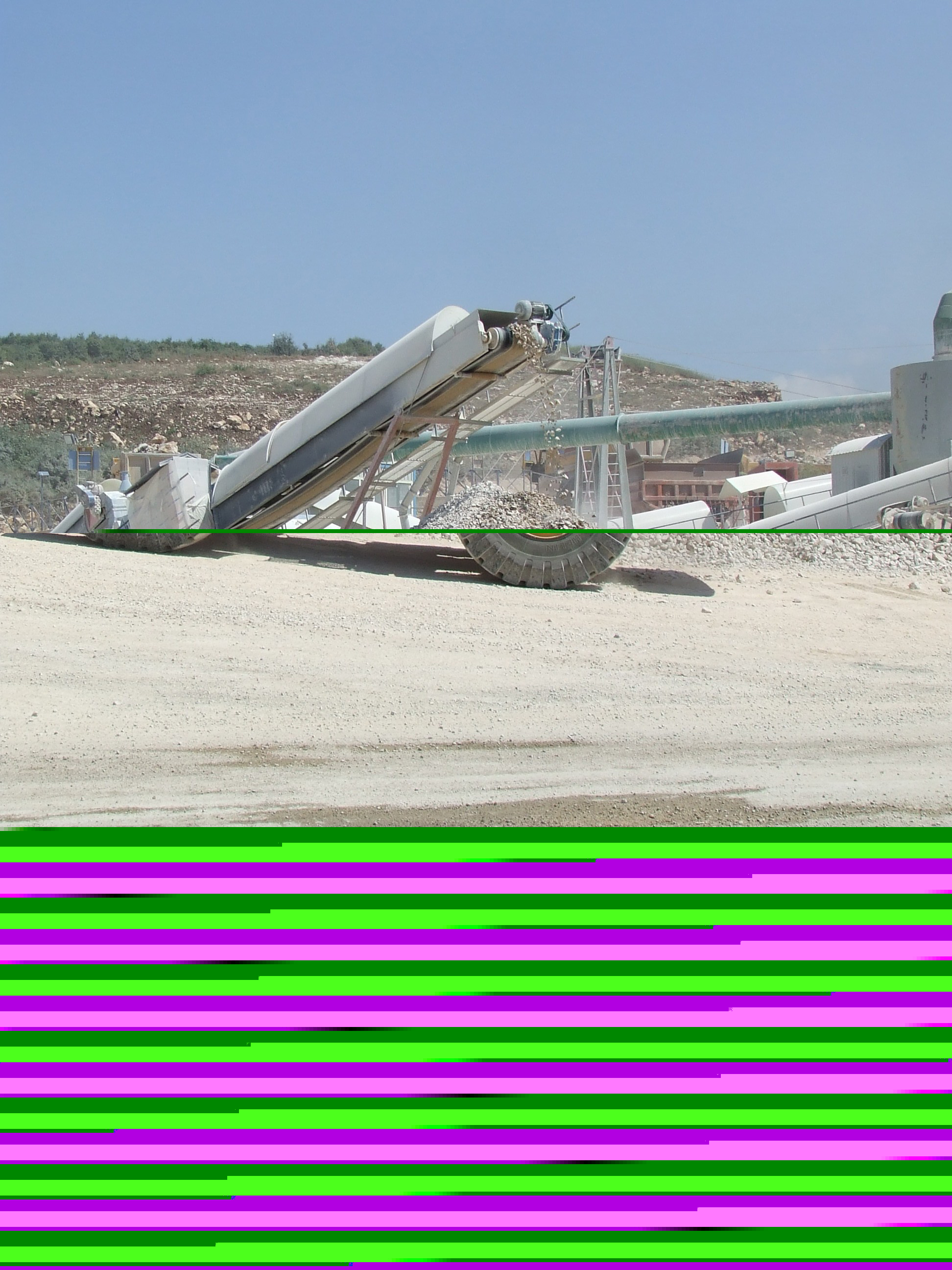
Turkey’s Simge Group is unusual in the quarry business - not only does it manufacture asphalt and aggregate equipment, it also operates a network of quarries producing construction aggregates and asphalt. ABE visited its Baskoy Quarry to find out more
With a geographical spread of five quarries across Turkey with an annual production of 12million tonnes per year, the
The company first moved into the aggregates business in 1990 as an upstream extension of its business but the quarries also provide ideal testing conditions for the company's new technology, as well as providing vital construction materials to the company's contracting operation. According to Simge, operating the quarries as a commercial business helps it to understand the challenges facing its asphalt equipment customers as well as giving them confidence in the testing of the equipment.
Nonetheless, the company has said that a road contractor operating a quarry in Turkey is not unusual and many contractors manage their own aggregate production. Simge started as a contractor and then later moved into the manufacturing of asphalt plants to meet the demands it was facing on its own sites. The company has said that it is the only company in Turkey manufacturing asphalt and aggregate equipment and producing the material too.
Simge's main quarry - Baskoy - near the city of Bursa in northwestern Turkey was set up in 1994 on a 20ha plot of land and production has been gradually ramped up to the current level of 1.6million tonnes of crushed limestone aggregate per year output. The quarry is currently the largest in the group's portfolio and has consented reserves that are estimated at another 120million tonnes.
The site also has an asphalt output of 400,000tonnes a year, again a significant portion of the 12million tonnes produced by the whole group each year. And the asphalt production level at the Baskoy site is set to rise with the commissioning of a sophisticated new plant at the quarry with an output of up to 320tonnes per hour, which is twice that of the earlier generation 160tonnes per hour plant currently in use at the site.
The quarry serves the needs of the city of Bursa which has a population of two million people and material is transported between 5 to 50km away from the quarry. The company has said material is sometimes transported further, depending on demand.
The quarry employs 45 people spread across the whole operation from working on the quarry floors and crushing facility through to managing the asphalt plant and other management duties.
Extraction
Baskoy quarry exploits a limestone deposit that is formed from 1% dolomite crystals and 98.5% crypto-microcrystalline calcite crystals. The remainder of the deposit is formed from small quantities of microfossils. Fractures and cracks in the body of the limestone have been found to be rich in micro-mezocrystalline crystals, hydroxide and iron oxide in some parts of the quarry.
Simge uses open pit production techniques at the quarry and is slowly restoring parts of the quarry as extraction progresses by reducing the slope angle, re-soiling the slopes and planting trees.
Peak production for the quarry runs from March through to November, during which output hits 2,000tonnes per hour. Bursa quarry manager Yavuz Küçüközel said, "We blast three to four times a week." Some 40 blastholes are drilled for each blast using an
The benches are 12m high and there are four working faces, with the blasting and aggregate production planned to ensure a consistent grade of material flowing through the crushing plant. As the quarry is not close to an urban area this makes blasting easier, while the Simge Group meets the needs of the authorities by having the police ensure that the paperwork is correct and that the security requirements are met before each blast.
Loading
The quarry uses a mix of machines for loading and stocking with excavators from
Küçüközel explained that he tells the purchasing department when a piece of equipment is required, which then negotiates a deal. However Küçüközel did say that low fuel consumption is one of the firm's priority buying requirements, along with reliability, durability and good service back-up from the dealer. This is because fuel taxes are high, resulting in even commercial diesel costing €1.5/litre.
Crushing and screening
The blasted stone is then carried by tipper truck to the tipping points and Ali Sevimilis, sales coordinator at the Simge Group explained that the size reduction system starts with the three primary crushers. The quarry's three primary units are all manufactured in Turkey and comprise of Burcelik CK10, Nace 110 and Gursan 110 jaw crushers.
DrillinG
1x Atlas Copco ROC D7-11
loaDinG
2x Volvo 150E wheeled loaders
1x Komatsu WA 470-3 wheeled loader
HaulinG
4x BMC Fatih RDTs
(operated by a subcontractor)
1x Dodge RDT
(operated by a subcontractor)
excavaTorS
1x Volvo EC 360BLC
BullDozer
1x Komatsu D155
primary cruSHerS
1x Burcelik CK10
1x Nace 110
1x Gursan Jaw 110
SeconDary cruSHerS
1x Tromnia
1x Nace K38
aGGreGaTe preparaTion
2x Simge ChallengerSecondary crushing is carried out by a Nace K38 and Tromnia crusher before tertiary crushing and screening is carried out with equipment supplied by the Simge Group's E-MAK manufacturing arm.
According to Simge, the aggregates from the Baskoy Quarry command a good price in the market due to the good geometrical shape, better grading, good flakiness index and sieve analysis results achieved by the quarry. The company has said it is the leading aggregates supplier in the region.
Following crushing and screening, material is either stored for sale directly as construction aggregates or is transferred into a Simge Challenger unit for preparation in readiness for the asphalt production process.
The Challenger stores aggregates internally allowing users to make major savings in heating and drying materials, cutting energy used in heating as well as CO2 emissions. Using the system can also boost aggregate output and increase asphalt plant efficiency, according to Simge.
Further benefits on fleet savings are made as the unit reduces the need for stocking and handling. The Simge Challenger also reduces bitumen consumption by 10-15%. Although developed originally for asphalt production applications, it can also be used to provide aggregates into a large concrete batching facility.
In concrete production applications the machine offers similar benefits for reducing energy consumption by reducing the fuel used in heating and drying as well as cutting CO2 emissions and maximising product quality.
The two asphalt plants at Simge's Bursa quarry are linked to two of the Challenger aggregate systems, while the Simge Group intends to add a Ratech recycling system to the new asphalt plant, so as to capitalise on the potential for recycled asphalt. It is worth noting that the new 320tonne/hour asphalt plant complies with European regulations on emissions and is heated by liquid natural gas, to maximise its efficiency. Meanwhile the plant also features sophisticated electronic controls, with a single operator able to control output through the entire system.
According to Simge, the rising cost of fuel is affecting aggregate production costs in Bursa and the company's other four quarries. The company has said that fuel currently accounts for 16% of the operating costs at the Bursa site, with the drilling, blasting and hauling representing 55% of costs, crushing and screening 27% and transport 2%.
But the company said that the biggest impact of rising fuel costs is being felt in the asphalt production costs side of the business. Nonetheless, the company claims to have reduced fuel consumption by 50% with the introduction of the Challenger system.
As Turkey has some 43% of the world's limestone reserves, aggregate costs are comparatively low at around e2.5 per tonne. But the country's bitumen costs are high so asphalt recycling is becoming more of an issue in Turkey. It was this factor that encouraged the Simge Group's E-MAK manufacturing arm to develop its innovative Ratech recycling system, which is designed to operate in addition to a conventional asphalt plant. And with the Simge Group running its own quarries, the firm is in the fortunate position of being able to fine tune its technology in the field.
A high percentage of the quarry's output is aimed at road construction, so material demand and specification trends are important issues for the Simge Group.
Most of the material is used by the construction sector, particularly the roads market with customers including the municipalities, the General Directorate of Highways and special provincial administrations, Both aggregates and asphalt are transported to the customer by trucks - some collect with their own fleet, while others have material delivered directly to them by the company.
With a high level of reserves remaining at the Bursa quarry and plans to install the new Ratech recycling system in development, the quarry looks set to further improve quality and efficiency in the future. Through the quarry, Simge is not only meeting local demand for high quality aggregates and asphalt, it is also seeing first hand the challenges facing modern quarry operations and working to develop the necessary solutions.


